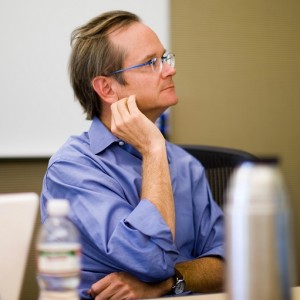Last week, in the days before Lawrence Lessig announced his presidential exploratory committee and called for an upending of the nation’s “rigged” political system, the Harvard professor phoned an Arizona-based political consultant named Carlos Sierra.
Lessig had met Sierra ahead of the 2012 election, when the former John McCain aide was managing the ill-fated White House campaign of former Louisiana Gov. Buddy Roemer, another maverick Republican (though previously a Democrat and later an independent) focused on campaign finance reform. As a longtime Democratic activist for that cause, Lessig was one of Roemer’s biggest backers in 2012, advocating for him in television appearances and opinion pieces. In the process, he got to know Sierra, who was happy to oblige when the professor recently sought advice on his own political future.
In an interview with InsideSources Wednesday, the consultant described advising Lessig about how to avoid the key failures of Roemer’s campaign, beginning with the 2012 candidate’s decision not to accept any individual contributions over $100.
“That was his biggest downfall,” Sierra said, noting that Roemer wasn’t invited to participate in any televised debates. “If he would have made the debates, he would have beat the crap out of those other guys.”
Sierra feels confident Lessig will clear the debate hurdle, saying a place on the stage “would give him instant credibility and viability.” To meet the Democratic National Committee’s threshold for entry — “at least 1 percent in three credible national polls within the six weeks before the debate” — he advised the professor against any contribution limit. He also told him not to object if independent groups mobilize to bolster his official campaign operation.
“As much as I don’t like Super PACs, I think in this day and age you almost have to have a Super PAC,” Sierra said.
But following all of Sierra’s advice could be awkward for Lessig, whose unorthodox campaign in waiting is largely aimed at fighting the influence of money in politics:
Lessig is exploring a run as a “referendum President” to get Congress to pass the Citizen Equality Act – legislation that would ensure equal access to the ballot box, end partisan gerrymandering, and establish a voucher system for elections that would remove the power of cronies and special interests and shift that influence to the American people.
Perhaps the most unusual part of Lessig’s potential bid is his commitment to “resign his office once the Citizen Equality Act is signed into law,” preferably handing the reigns to his vice president on the very first day of his presidency.
In his announcement video, Lessig said he will formally enter the race after Labor Day “if we hit our funding target and the leading candidates in the Democratic primary do not commit to making this fundamental reform the first priority of their administration.” His fundraising goal is $1 million.
It obviously remains to be seen how much enthusiasm the prospect of a Lessig campaign will generate, but at least one political reform group is excited.
“We are thrilled that more and more candidates are using the presidential race to call attention to the corrupting influence of money in our political system,” Tzipora Lederman, a spokeswoman for the Represent.Us campaign against money in politics, said in a statement. “It is one of the most pressing issues we face as a nation, and Lawrence Lessig’s presidential run would push more candidates to take a firm stand on the issue.”
As for Sierra, he told InsideSources he doesn’t have any formal role in the professor’s campaign-to-be, but he’s happy to keep providing advice. The self-described “independent Republican” added, “I might not agree with Lessig on some of his economic principles, but I know he’s not going to be bought. I know he’s not going to be corrupted. And for me right now, that’s good enough.”

